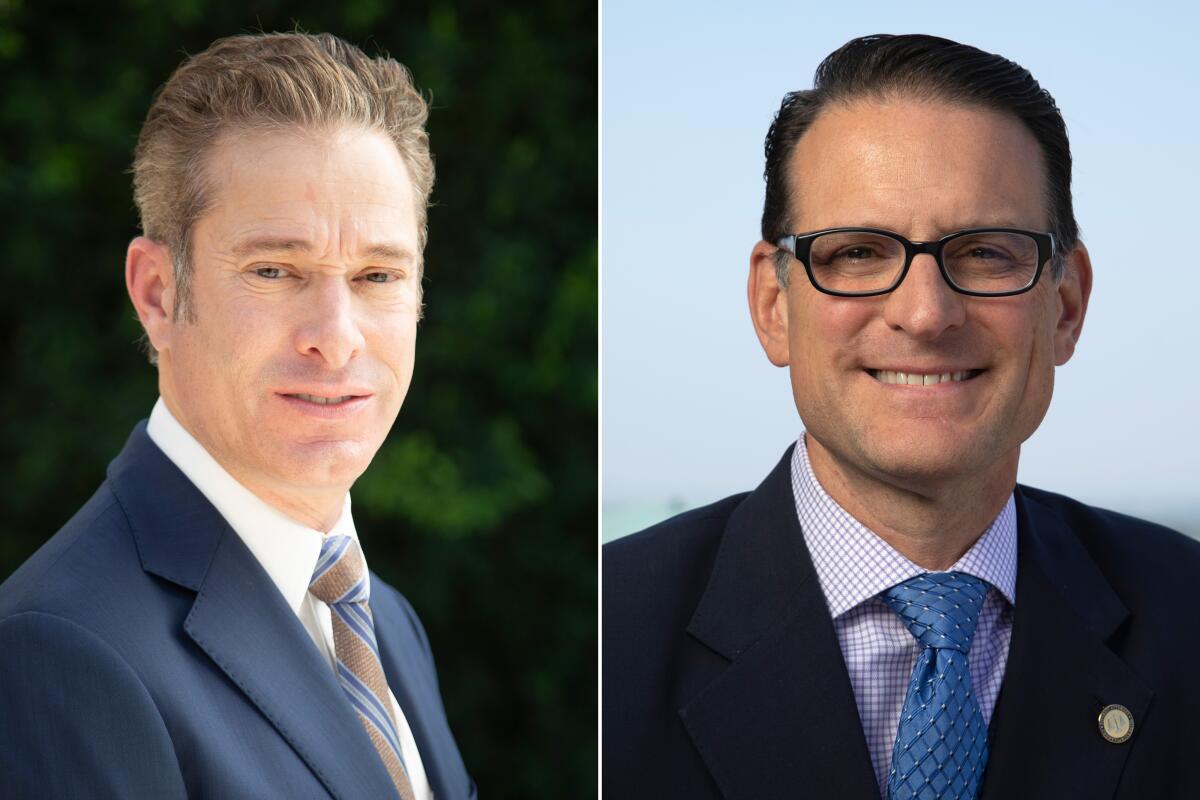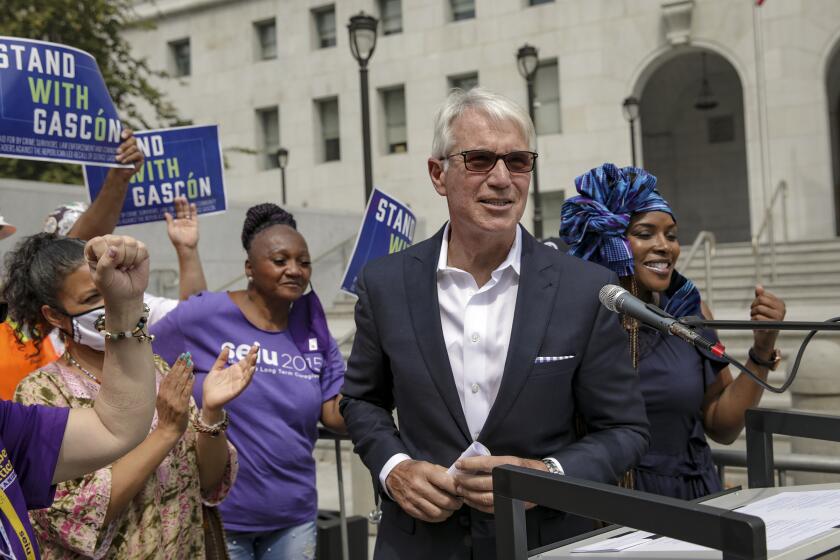An infant’s death prompts accusations in Riverside County district attorney’s race

- Share via
Jawhon Burts appeared in a Riverside County courtroom in late September, charged with a felony for a strangulation attack on the mother of his child.
The prosecutor wanted him to serve a six-month jail term. But under a plea deal Burts struck with a Superior Court judge, the charge would be reduced to a misdemeanor if Burts completed a 52-week program for batterers.
The agreement would have escaped public notice if not for what happened next.
In December, less than three months later, Burts, 30, of Indio, was arrested again, this time on charges of torturing and murdering his 7-month-old son, Kyrie.
“Had the court chosen to impose the 180-day custody term as requested by the People, the murder of the defendant’s child could have been prevented,” Deputy Dist. Atty. Barrett Von Esch wrote in a sentencing memorandum for the domestic violence case.
Language of this kind — appearing to lay blame on a judge for a horrific outcome — is extraordinarily rare from prosecutors. It comes as the judge in question, Burke Strunsky, is challenging Von Esch’s boss for the job of Riverside County district attorney in the June 7 election.
Strunsky says that is the true motive for the memo, and he has filed an attorney-misconduct complaint with the California State Bar, denouncing the prosecutor’s remarks as inaccurate, unfair and politically motivated.
Strunsky insists there was no legal basis to take Burts into custody on the day of the plea. The district attorney’s office has “weaponized” the Burts case for political gain with “false statements ... that essentially accused me of being responsible for the death of an infant child in a homicide case,” Strunsky wrote.
As they try to recall Los Angeles County Dist. Atty. George Gascón, prosecutors still must carry out the enormous workload of the office. With distrust running high, even mundane tasks get more complicated.
Riverside County Dist. Atty. Mike Hestrin declined to comment on the Burts case directly. He is running for a third term as a law-and-order candidate whose office handles 50,000 to 60,000 criminal cases a year across a vast county that stretches to the Arizona border.
He said Strunsky, if elected, would be a progressive prosecutor “in the model of George Gascón,” referring to the Los Angeles County district attorney.
Strunsky disputes the description. He calls himself a pragmatist and a moderate, and said the sentencing memo is an example of the district attorney’s attempt to mischaracterize him as soft on crime.
“It’s a way of getting voters to say I’m a weak liberal judge,” he said. “It’s using the office’s authority inappropriately.”
Before becoming a judge, Strunsky was a deputy district attorney for 15 years whose successful murder prosecutions were featured on “Dateline” and “20/20.” His campaign is endorsed by Gov. Gavin Newsom, which may or may not help in a county that voted to recall the governor last year.
The sparring between one of Hestrin’s deputies and Strunsky has brought attention to the race.
On the morning of Jan. 23, 2020, Riverside County deputies arrived at the apartment of Hallie Knighton, the 26-year-old mother of Burts’ young daughter, in unincorporated Bermuda Dunes.
Knighton told deputies that during an argument, Burts shoved her into a wall and grabbed her by the throat, strangling her for about a minute until her vision began to go black, according to an arrest affidavit. She said their 2-year-old daughter witnessed the incident.
Knighton refused to go to the hospital and refused to press charges. After Burts was charged with felony domestic violence and a no-contact order was imposed, she successfully requested that it be modified to forbid only negative contact. She gave birth to Burts’ son, Kyrie, and she continued to see him.
The felony domestic violence charge carried a maximum five-year term, and on Sept. 27, attorneys from both sides met with Strunsky to discuss how to resolve it.
The prosecutor wanted Burts to serve 180 days in custody. It was Burts’ second domestic violence case involving an allegation of strangulation. In the prior case, from July 2018, another girlfriend told police that Burts had squeezed her throat violently during a fight in a car.
The district attorney’s office had filed the 2018 case as a misdemeanor domestic battery and allowed him to plead guilty to a lesser charge of disturbing the peace, designated as a “415” in the California Penal Code.
Strunsky said the prosecutor did not inform him that the 2018 case had involved an allegation of strangulation.
“That would have been such a red flag, but they never mentioned that,” Strunsky said. “If it was a strangulation, why did they plead it to a 415? It’s literally the charge you would put on your neighbor for playing music at night.”
Burts had already been in the domestic batterers program for months when Strunsky allowed him to strike the deal in the Bermuda Dunes case.
In December, a facilitator in the batterers program estimated Burts’ risk of recidivism as low and wrote that he “continues to make great effort” and was “practicing ways ... to prevent resorting to violence in his current relationship.”
Later that month, police arrived at the Indio apartment where Burts was living with Knighton to find that Kyrie was not breathing. Prosecutors say the child had a skull fracture, scalp and chest bruising and linear neck abrasions.
Prosecutors say Burts admitted to being the sole caregiver that day, and that his daughter said that Burts had at least once placed a cord around the infant’s neck.
“This was the homicide of his own son,” Von Esch wrote in the sentencing memorandum to the court last month, arguing that Burts should get the maximum five-year term for the Bermuda Dunes domestic violence case.
“There is a direct rationally discernible line of progression: from battery to felony domestic violence, from felony domestic violence now to homicide,” the prosecutor wrote. “The defendant had clearly not learned his lesson and continues to commit crimes of an increasingly serious nature, culminating in the ultimate crime — homicide.”
Von Esch added: “Had the court followed the People’s recommended sentence of a felony plea with 180 days custody time a life could have been spared.”
But neither the prosecutor nor Strunsky could have compelled Burts to take a plea that resulted in any jail time. Even if Burts had agreed to the 180-day jail term, it is far from certain that he would have been in lockup on the day in question. In reality, 180 days means half that time, and because of overcrowding, it is often even less, according to the Riverside County Sheriff’s Department, which runs the jails.
Burts has pleaded not guilty to charges of murdering and torturing his son. His attorney, Shaun Sullivan, said Burts “was performing admirably in his court mandated classes,” adding: “Mr. Burts called 911 and was performing resuscitative measures on Kyrie when the authorities arrived. Further, the autopsy shows no indication of strangulation.”
Sullivan said the sentencing memo attacking Strunsky was “a disgraceful attempt” by Hestrin’s office to hurt a political rival, and said he will ask the court to have the D.A.’s office removed from the case.
Along with Strunsky, Lara Gressley, an appellate lawyer with a background in criminal defense, is challenging Hestrin for the D.A. job. She questioned why Burts was charged with misdemeanor domestic violence on his first domestic violence case, rather than a felony, and was then allowed to plead guilty to a reduced charge of disturbing the peace.
“That’s less than a slap on the wrist,” Gressley said. “It’s extremely disingenuous for the D.A. to blame the judge in this instance, because there are so many failures on the D.A.’s part.”
Hestrin, as the two-term incumbent, has vastly out-raised his two challengers in the race and enjoys the funding and endorsement of law enforcement unions. According to the most recent campaign disclosures, Hestrin has raised about $1 million, Strunsky $117,000 and Gressley $100,000.
Gressley and Strunsky have made it a point not to take police union money. Gressley has the endorsement of the Riverside Press-Enterprise, and she describes Strunsky as a “far-left progressive,” a label he has resisted in a county where it carries major political liabilities.
She points to Strunsky’s supporters as evidence of his political leanings. Along with Newsom, Strunsky has been endorsed by Planned Parenthood and Inland Empire United, a nonprofit that champions progressive causes.
There have been no public polls on the D.A.’s race. If no candidate wins a majority of votes in June, the top two finishers will compete in November.
Strunsky said there was no reason other than politics for Von Esch to have written the sentencing memo on the domestic violence case in the first place. That is because the murder charge puts the domestic violence case firmly on the back burner.
Get the lowdown on L.A. politics
Sign up for our L.A. City Hall newsletter to get weekly insights, scoops and analysis.
You may occasionally receive promotional content from the Los Angeles Times.
The D.A.’s office replied that memos are necessary “to preserve arguments” and “inform the record” as cases wind their way through the courts, often in the hands of new judges and lawyers.
Brian Gurwitz, a defense attorney who sometimes practices in Riverside County, said Strunsky’s decision in the Burts domestic violence case — agreeing to reduce the felony to a misdemeanor if Burts completed the batterers program — was “an extremely middle-of-the-road sentence,” adding: “There’s nothing about this sentence that would surprise the attorneys on either side.”
Strunsky said it is not a coincidence that the memo was filed three months after he declared his candidacy for district attorney. If prosecutors had considered Burts a serious threat in September, they had a duty to ask that his bail be revoked and that he be taken into custody, Strunsky said. But they did not.
“That I think gives you a sense of what everybody thought about his dangerousness,” Strunsky said. “No one could have predicted the result.”
More to Read
Sign up for Essential California
The most important California stories and recommendations in your inbox every morning.
You may occasionally receive promotional content from the Los Angeles Times.












